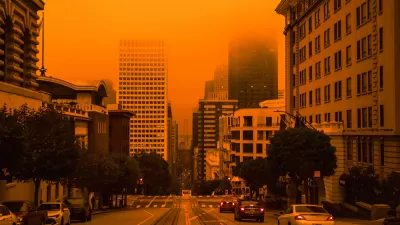TV weather reporters should be educators of the public about climate change. Yet they range from being outright deniers to keeping silent about this cataclysmic threat to life on Earth. An examination of why and what can be done about it.
Television weather news in the United States tends to be bizarrely quiet on an issue that is directly on-topic and supremely important: global warming. Bill Adams, a land use attorney from San Diego, cites a local example, and goes on to note:
There are dozens of high-profile weather reporters across the country willing to pit their unimpressive scientific credentials backed by their impressive egos against the weight of scientific opinion and studies, as set forth in this 2010 Think Progress report on climate change denier weather reporters. Additionally, there are slick and well funded websites promoting denial of climate change science, e.g., junkscience.com, which goes to great lengths to make it appear that it is mainstream science and that climate change is based on “junk science.” Notably, and not coincidentally, the term “junk science” was coined by the tobacco industry to discredit science demonstrating the destructive health impact of smoking. Steven J. Milloy, the founder of junkscience.com, has close ties to both the tobacco industry and the oil industry, and he is a correspondent for Fox News.
Such misinformation is often promoted by people on the periphery of climate change science cloaked in false expertise.
However, Adams believe these self-assured but misguided deniers aren't as bad as those who know better but remain silent:
Perhaps more damaging than the purveyors of contra-scientific views on climate change is the conspicuous absence of weather reporters, or their news media employers, who accurately report climate change science. They may fear alienating viewers who hold strong denial beliefs or corporate sponsors, or there may be other reasons for their silence. Or maybe its a structural bias, as discussed in the very thoughtful Inside Climate News article – Why Don’t TV Meteorologists Believe in Climate Change? Whatever the reason, it is an important part of the dysfunction that is preventing the country from taking the steps necessary to avoid the greatest cataclysm humans have ever faced – one which will take a toll on life and habitability on a scale unmatched since volcanoes and a meteor wiped out most life on earth by rapidly changing the global climate from tropical to arctic.
Adams believes that weather reporters must play a lead role in educating the public about climate change science. He makes the following recommendations to get recalcitrant reporters and their employers to speak the truth:
1) It would be incredibly helpful, especially in the Western U.S., to regularly see a graph or comparison of current seasonal average temperatures with historic averages. The same goes for precipitation, snow pack, and ocean temperatures. These graphs should be a routine part of every TV and newspaper weather report. While a few politically polarized viewers may see conspiracy behind such hard data, most viewers will not.
2) It’s time for the public to pressure stations to remove the self-imposed gag on climate change discussion – whether by petition, email, or boycott.
3) Environmental organizations should endorse the most environmentally accurate stations and encourage their supporters to watch these stations.
FULL STORY: How TV news weather reporters are aiding and abetting climate change

Maui's Vacation Rental Debate Turns Ugly
Verbal attacks, misinformation campaigns and fistfights plague a high-stakes debate to convert thousands of vacation rentals into long-term housing.

Planetizen Federal Action Tracker
A weekly monitor of how Trump’s orders and actions are impacting planners and planning in America.

In Urban Planning, AI Prompting Could be the New Design Thinking
Creativity has long been key to great urban design. What if we see AI as our new creative partner?

Chicago’s Ghost Rails
Just beneath the surface of the modern city lie the remnants of its expansive early 20th-century streetcar system.

Baker Creek Pavilion: Blending Nature and Architecture in Knoxville
Knoxville’s urban wilderness planning initiative unveils the "Baker Creek Pavilion" to increase the city's access to green spaces.

Pedestrian Deaths Drop, Remain Twice as High as in 2009
Fatalities declined by 4 percent in 2024, but the U.S. is still nowhere close to ‘Vision Zero.’
Urban Design for Planners 1: Software Tools
This six-course series explores essential urban design concepts using open source software and equips planners with the tools they need to participate fully in the urban design process.
Planning for Universal Design
Learn the tools for implementing Universal Design in planning regulations.
planning NEXT
Appalachian Highlands Housing Partners
Mpact (founded as Rail~Volution)
City of Camden Redevelopment Agency
City of Astoria
City of Portland
City of Laramie




























